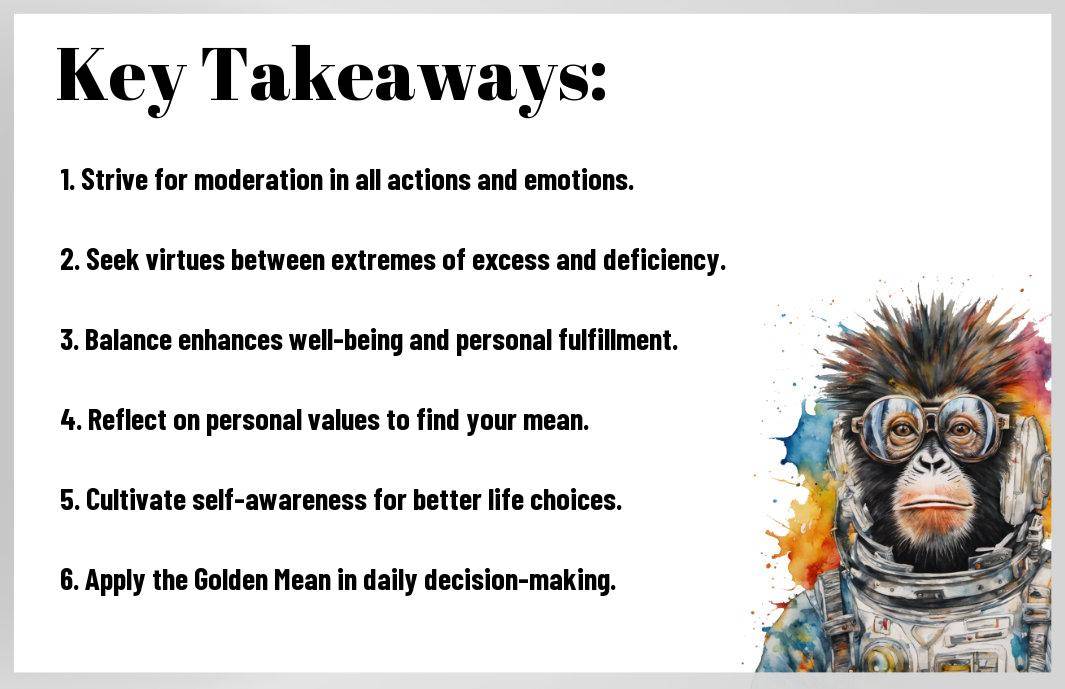Many of us strive for balance in our hectic lives, but finding that sweet spot can be challenging. I want to share how Aristotle’s Golden Mean can guide you in achieving harmony by embracing moderation in various aspects of your life. This timeless philosophy encourages you to avoid extremes and seek a balanced approach, making it easier to foster well-being and happiness. Join me as we explore practical ways to apply this ancient wisdom to our everyday lives for a more fulfilling and balanced experience.
Key Takeaways:
- Aristotle’s Philosophy: Explore the concept of the Golden Mean, which suggests that virtue lies between two extremes.
- Moderation: Emphasize the importance of finding a balance in all aspects of life, avoiding excess and deficiency.
- Personal Growth: Use the Golden Mean as a guide for personal development, encouraging reflective practices and self-awareness.
- Contextual Nature: Understand that the right balance may vary across different situations and individuals.
- Holistic Approach: Consider emotional, intellectual, and physical well-being as interconnected elements that contribute to overall balance.
- Practical Application: Implement the Golden Mean in daily decisions, from work-life balance to health and relationships.
- Long-Term Well-Being: Aim for a sustainable lifestyle by continually adjusting and aligning actions with virtuous moderation.


Understanding Aristotle’s Golden Mean
Aristotle’s Golden Mean is a timeless concept that explores the idea of balance and moderation in our lives. As I probe into Aristotle’s philosophy, I find this principle particularly relatable and applicable today. The Golden Mean suggests that virtue lies between extremes; it isn’t about choosing the lesser of two evils but striving for a balanced approach to everything we do. For example, courage is a virtue found between the extremes of recklessness and cowardice. By aspiring to find this middle ground, I believe we can lead a more harmonious and fulfilling life.
The Concept Explained
An important element of Aristotle’s philosophy is that finding this balance requires self-awareness and mindfulness. It isn’t always easy, as our emotions and circumstances can sway us towards one extreme or another. This is why I think it’s vital to consistently reflect on our feelings and actions. By doing so, we can identify where we might be leaning too far in one direction and make conscious efforts to redirect ourselves towards a more moderate path.
Historical Context
Mean values and the pursuit of balance can be traced back to ancient Greece, where Aristotle lived and worked. His ideas were part of a broader philosophical landscape that valued reason and ethical living. While many thinkers before him dabbled in the notion of virtue, Aristotle’s focus on the mean as a practical guideline for behavior distinguished his view. He not only emphasized the importance of finding equilibrium in our actions but also the significance of cultivating good habits in every aspect of our lives.
Even today, Aristotle’s insights remain relevant as we navigate the complexities of modern life. We are often bombarded with choices that can push us towards extremes, be it in our work-life balance, personal relations, or health. By embracing the Golden Mean, I believe we can better manage these pressures and find a healthier, more fulfilling path. It gives us a framework to evaluate our actions and decisions, allowing us to create a life filled with richness and variety, all while staying true to ourselves.
Applying the Golden Mean to Our Lives
One of the most enriching ways to integrate Aristotle’s Golden Mean into our lives is by finding balance in our daily activities. By identifying where we tend to swing towards excess or deficiency, we can cultivate a more harmonious lifestyle. For me, this means evaluating how I allocate my time between work, relaxation, and social interactions. I’ve found that scheduling short breaks throughout my workday allows me to recharge and maintain my productivity without overextending myself. It’s all about discovering that sweet spot where I feel both fulfilled and content.
Finding Balance in Daily Activities
At the core of achieving this balance is the act of mindfulness. I’ve started to consciously assess how I feel during various activities and adjust accordingly. Whether it’s recognizing that I’ve burned out from too many late-night projects or acknowledging when I need more social interaction to combat feelings of loneliness, I’m learning to listen to my own needs. You might consider keeping a simple journal to track your feelings regarding different activities—finding patterns can be incredibly revealing and guide you toward a more balanced life.
Making Decisions with Moderation
With decision-making, the Golden Mean serves as a fantastic guide for ensuring I don’t succumb to impulsivity or indecision. During times of choice, whether it’s selecting what to eat or deciding on a career move, I’ve learned to pause and reflect. This moment of clarity allows me to weigh my options without being overly cautious or rash. A balanced approach helps me to cultivate confidence in my decisions, allowing me to commit to a choice without feeling overwhelmed by what could have been.
Plus, practicing moderation in decision-making encourages a healthier mindset. When I focus on striking that balance, I feel more in control of my choices, and it makes me less likely to experience the regret that often comes with extreme decisions. It brings a sense of peace knowing that I can make choices that align with my values without being swayed by external pressures. By continually asking myself what lies at the golden mean, I cultivate a harmonious decision-making process that enriches my life experience.

The Role of Virtues in Achieving Balance
To truly achieve balance in our lives, it’s important to understand the virtues that guide our actions and decisions. Aristotle believed that virtues are the appropriate middle ground between two extremes, which can lead us toward a more fulfilling and harmonious existence. By identifying and practicing these virtues, we can navigate the complexities of life with grace and intention. It’s not just about knowing what is good; it’s about cultivating those qualities within ourselves and applying them in our daily lives.
Identifying Key Virtues
The first step in this journey is identifying the virtues that resonate with you personally. Some virtues, like courage, honesty, or compassion, might resonate more with your values and aspirations than others. When I reflect on my personal life, I find that compassion stands out for me, as it encourages me to connect with others and understand their perspectives. This identification process helps to clarify your intentions and serves as a compass to guide your decisions moving forward.
Practicing Virtue in Everyday Situations
Along with identifying virtues, it’s just as important to practice them in everyday situations. This means applying your chosen virtues in real-life scenarios, whether at work, with family, or within your community. For example, if you value honesty, finding ways to communicate openly in challenging conversations can deepen your integrity and strengthen your relationships. Each small act of practicing virtue contributes to your overall sense of balance and enhances your life experience.
Even the simplest interactions can be a platform for practicing these virtues. Consider moments like offering help to a colleague who is overwhelmed or taking a moment to sincerely listen to a friend in need. These actions may seem minor, but they reflect your commitment to living a virtuous life and can profoundly impact both your well-being and that of others. The more you weave these virtues into your daily activities, the closer you move towards achieving that cherished balance in life.
Overcoming Extremes: Challenges and Solutions
Many of us find ourselves swinging between extremes in various aspects of our lives. Whether it’s work versus leisure, socializing versus solitude, or indulgence versus restraint, these extremes can lead to feelings of discontent or overwhelm. I’ve been there—it can be tough to find that sweet spot where I feel balanced. Acknowledging these extremes is the first step. When I take a moment to reflect on my habits and choices, I can start to identify where I might be leaning too heavily in one direction. That awareness is key in overcoming the challenges that come with living in extremes.
Recognizing Personal Extremes
Extremes can often be subtle; I might not even realize I’m overindulging or underdoing something until I hit a wall. For example, I might work long hours, pushing myself to achieve more, but at the expense of my personal relationships and health. It’s important to regularly check in with myself. I ask questions like, “Am I spending too much time on my phone?” or “Have I been avoiding social interactions?” This self-examination helps me highlight areas where I could be leaning too far in one direction, illuminating the path toward a more balanced life.
Strategies for Maintaining Balance
Above all, finding balance requires implementing practical strategies that support my overall well-being. Setting boundaries is one method I find effective; I often designate specific times for work and personal activities. I also remind myself to take breaks and engage in hobbies that recharge my spirit. The act of creating a routine that alternates between tasks and leisure is vital. Another powerful strategy is to establish a support system; I talk to friends and family about my goals and challenges, which keeps me grounded and focused on balance.
In addition to setting boundaries and creating a routine, I find it helpful to practice mindfulness. This could be as simple as taking a few moments each day to breathe deeply and reflect on my feelings. By tuning in to my internal state, I can notice when I’m slipping towards an extreme and adjust accordingly. Embracing flexibility in my approach allows me to navigate life’s ups and downs with a sense of ease. It’s all about finding what works for you and tailoring strategies that help you maintain that delicate balance in your own life.
Real-Life Examples of the Golden Mean
Keep in mind that the principles of Aristotle’s Golden Mean can be found in various aspects of our daily lives. Whether it’s about fostering relationships, handling stress, or achieving personal ambitions, finding that sweet spot between extremes can lead to a more fulfilling existence. The beauty of its application lies in recognizing that balance is dynamic; it requires continual adjustment and awareness, guiding us to make better choices in our everyday interactions and decisions.
Success Stories
At one point in my life, I found myself overwhelmed with work commitments, often sacrificing quality time with family and friends. In my quest for professional success, I veered towards excess—fuelled by ambition yet neglectful of my personal responsibilities. After learning about Aristotle’s concept of the Golden Mean, I decided to reevaluate my priorities. Instead of diving headfirst into work, I set boundaries and focused on being present in both my career and my relationships. The result? A rejuvenated sense of fulfillment and improved connections with my loved ones, leading to a more rewarding life overall.
Lessons Learned
At the same time, I’ve realized that applying the Golden Mean is not always straightforward; it takes practice and self-reflection. Through adopting moderation in my pursuits, I learned to appreciate the importance of balance across all areas of life. You don’t need extremes to achieve satisfaction; finding that middle ground can sometimes be the key to unlocking your true potential. I’ve applied this principle in my personal wellness journey as well, understanding that neither excessive workouts nor complete inactivity will yield the healthiest results.
This journey of learning has taught me that balance is often about small adjustments rather than monumental shifts. I’ve come to appreciate how taking a step back to evaluate my feelings and motivations can lead to more thoughtful choices. By striving for moderation in my emotional responses, my work commitments, and my leisure activities, I’ve experienced a renewed sense of energy and focus, paving the way for improved overall well-being. Embracing the Golden Mean not only helps in achieving balance in life but also opens the door to continuous growth and self-improvement.
Tips for Cultivating a Balanced Life
Despite the challenges that life can throw our way, I’ve found that cultivating balance is entirely possible with the right mindset and practices. Here are a few tips that I’ve personally found helpful:
- Start your day with intention, perhaps through journaling or meditation.
- Engage regularly in physical activity that you enjoy, whether it’s yoga, walking, or dancing.
- Limit your screen time and make room for face-to-face interactions.
- Set boundaries to protect your time and energy.
- Make time for hobbies that bring you joy and fulfillment.
Knowing what feels balanced for me has been a journey, and I encourage you to explore what balance looks like in your own life.
Daily Practices for Mindfulness
Against the hustle and bustle of everyday life, practicing mindfulness can be a game-changer in achieving balance. I often carve out a few moments daily to simply breathe and be present. This could be as simple as five minutes of deep breathing or mindful observation during a walk in nature.
By making mindfulness a daily practice, I find it easier to manage stress and maintain focus. This intentionality helps me cultivate a deeper connection with myself and my surroundings, reminding me of what truly matters each day.
Building a Support System
Between the variety of demands in life, having a solid support system can help you maintain balance. I’ve learned that surrounding myself with friends and family who uplift and encourage me makes a world of difference. Engaging with people who understand my journey creates a sense of belonging and strengthens my resilience.
Support comes not only from friends and family but also from communities that share similar interests or values. Finding groups where you can connect and share experiences—be it through a hobby, work, or volunteering—can foster friendships that enrich your life. Additionally, leaning on mentors or joining support groups can provide guidance and reinforce the idea that I am not alone in my quest for balance.
Conclusion
Upon reflecting on the importance of achieving balance in life with Aristotle’s Golden Mean, I understand that it can serve as a guiding principle for navigating my daily choices. Striving for moderation in my emotions, actions, and desires allows me to foster a more harmonious existence. Instead of leaning too far into extremes, I can cultivate a more fulfilling and satisfying lifestyle that honors both my needs and the needs of those around me. It’s about finding that sweet spot where I can thrive while also contributing to the well-being of my community.
In my journey toward balance, I find it helpful to explore resources that deepen my understanding, such as Finding a key to reading Life through Aristotle’s Golden Mean. Engaging with these insights reminds me that the path to equilibrium isn’t a destination but an ongoing process. By embracing this philosophy, I can make thoughtful choices that lead to a more balanced and enriched life, one small step at a time.
FAQ: Achieve Balance in Life with Aristotle’s Golden Mean
Q1: What is Aristotle’s Golden Mean?
A: Aristotle’s Golden Mean is a philosophical concept that advocates for moderation and balance in every aspect of life. It suggests that virtue lies between two extremes: excess and deficiency. By aiming for this balanced state, one can lead a healthier and more fulfilling life.
Q2: How can I apply the Golden Mean to my daily decisions?
A: To apply the Golden Mean, assess your habits and behaviors by identifying the extremes you may experience—such as workaholism (excess) and laziness (deficiency). Strive to find a moderate approach, such as allocating time for work, leisure, and self-care, ensuring that no aspect dominates your life.
Q3: Can you provide examples of virtues according to the Golden Mean?
A: Sure! Some examples of virtues based on Aristotle’s Golden Mean include:
– Courage (the mean between recklessness and cowardice)
– Generosity (the mean between prodigality and stinginess)
– Temperance (the mean between overindulgence and insensibility).
By identifying these virtues, you can strive for balance in your life.
Q4: How does the Golden Mean relate to emotional wellbeing?
A: The Golden Mean emphasizes emotional balance by encouraging individuals to manage their feelings through moderation. For instance, too much anger can lead to rash decisions, while too little may result in passive behavior. Striving for a balanced expression of emotions can enhance mental health and interpersonal relationships.
Q5: What are the benefits of achieving balance through the Golden Mean?
A: Achieving balance promotes overall wellbeing, reduces stress, enhances relationships, and leads to a more prosperous life. By following the Golden Mean, individuals can develop a greater sense of self-awareness, more effective decision-making skills, and an improved capacity to cope with life’s challenges.
Q6: Is Aristotle’s Golden Mean relevant in modern life?
A: Yes, Aristotle’s Golden Mean remains highly relevant in today’s fast-paced society. As individuals face pressures like work-life balance and social expectations, the teachings of moderation can guide them toward healthier lifestyles and more meaningful interactions.
Q7: How can one maintain balance over time?
A: Maintaining balance is an ongoing process that involves regular reflection and adaptation. It’s important to periodically evaluate your habits and lifestyle choices. Setting goals, prioritizing tasks, and being open to change are imperative for sustaining equilibrium in various aspects of life.



